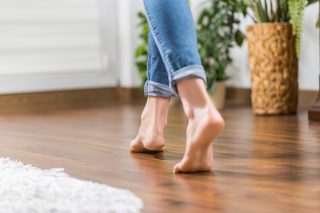It’s no secret that walking is good for us. But with many of us desk-bound during the day, it can be difficult to get moving and fit into your walk.
But because we know that we need to get moving, we tend to think it’ll all be okay if we just go for a long walk on the treadmill or in the park a couple of times a week. However, this doesn’t seem to be the best option. At least not, according to board-certified cardiologist Sidney Glasofer, MD, FACC.
Does a long walk make up for not moving enough during the week?
The short answer here seems to be no. Unfortunately, many of us get caught up at work and can’t seem to fit in a short walk during our breaks. Instead, we try desperately to make up for it with a much longer walk once or twice a week. Yet, according to Dr. Glasofer, this is not the way to go.

Monkey Business Images/Shutterstock
In fact, it’s potentially really negative for us and can have detrimental effects when it comes to heart health. According to Dr. Glasofer, daily movement is much better for your overall health. He maintains that this is the case even when you can’t get the recommended 30 minutes into your day.
The best thing is that, thankfully, you don’t have to walk consistently for 30 minutes for it to be beneficial. Any walk, whether it be during a commute or from your car to your office,, contributes. Even just standing and walking around the office if you have a desk job can prove highly beneficial.
Dr. Glasofer recommends a moderate walk for at least 30 minutes total. Try to look at it not only from a physical health perspective but also from a mental one. Staying at your desk all day is never going to be good for you. Any time you can get away to take a break and get some fresh air is a good form of escape.
Walking also has other benefits
Not only is getting your daily walk incredibly beneficial for your heart health, but it also has other benefits. Moving is great for your mental health. This is especially true when you opt to get your exercise outdoors. Going for even a short walk can, according to Dr. Glasofer boost your mood and help you break up your day. One study found that just 30 minutes of moderate-intensity cardio 3 times a week can reduce anxiety and depression.
 And really, it’s no surprise that a cardiologist recommends walking. Walking is an aerobic cardiovascular exercise (usually simply referred to as cardio) and all cardiovascular exercise has been proven to be great for your health.
And really, it’s no surprise that a cardiologist recommends walking. Walking is an aerobic cardiovascular exercise (usually simply referred to as cardio) and all cardiovascular exercise has been proven to be great for your health.
Regular cardio has been shown to:
- Helps you lose weight and can also be beneficial for maintaining a healthy weight
- Increase stamina
- Strengthen the heart and aid in boosting heart health
- Help in the prevention and management of chronic conditions
- Boost your immune system
Sedentary lifestyles are incredibly bad for us
Sedentism or living a sedentary lifestyle is dangerous for our overall health as humans. At its core, living a sedentary life simply means that you rest a lot and take little exercise. According to Mayo Clinic, this is a modern issue. These days, on average, Americans spend 13 to 15 hours per day sitting.
Two centuries ago, the average amount of time spent sitting was just three to five hours. Humans aren’t actually built to sit, we are supposed to stand upright. Because of this, the body works much more efficiently when we are upright than when we are sitting. The whole cardiovascular system works more efficiently when we are standing which is what leads to physical activity making us feel better.
Some simple ways to increase your movement around the house or office are:
- Get up and walk around whilst on phone calls
- Make sure you move or change positions at least every hour

REDPIXEL.PL/Shutterstock
- Walk around during commercials on TV or stand for part of your Netflix episode or movie
- Do some heel raises (Evelyn O’Neill, manager of outpatient exercise programs at the Harvard-affiliated Hebrew Rehabilitation Centre recommends doing these whilst you brush your teeth).
- Do some stand and sit exercises. O’Neill recommends “10 reps of stand-and-sit exercises, where you rise from a chair without using your arms and then sit down again to complete one rep”.
- Use the stairs instead of the elevator (lift) or escalators
- Go for a walk during your lunch break
- Go for a walk with your dog (if you have one) either around the neighborhood or in your local park.
The takeaway
It’s much more important to move every day and break the sedentary habits that office work has thrust upon us than it is to go for a 20-kilometer walk over the weekend. On average, you want to be walking for around 30 minutes a day at least five days a week. How you choose to achieve this is really up to you.
Dr. Glasofer comments that if you’re a morning person, you might want to leave 15 minutes early for your commute and walk part of the way. Alternatively, you can opt to fit a power walk in during the day or, maybe, walking your dog in the evening works best for you. There’s no ‘one-size-fits-all’ solution; you really have to take a look at your life and see when and where getting those steps in will work best for you.
References
https://www.wellandgood.com/is-short-walk-enough-exercise/
https://www.healthline.com/health/walking-vs-running#benefits
https://www.ncbi.nlm.nih.gov/pmc/articles/PMC1470658/
https://www.verywellfit.com/walking-vs-running-for-weight-loss-3973819
https://www.betterhealth.vic.gov.au/health/healthyliving/the-dangers-of-sitting
https://medlineplus.gov/healthrisksofaninactivelifestyle.htmlhttps://www.health.harvard.edu/blog/move-more-every-day-to-combat-a-sedentary-lifestyle-2018052413913




![women [longevity live]](https://longevitylive.com/wp-content/uploads/2020/01/photo-of-women-walking-down-the-street-1116984-100x100.jpg)










